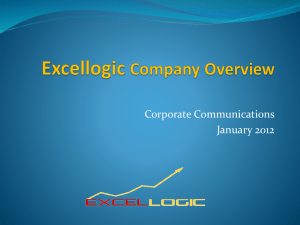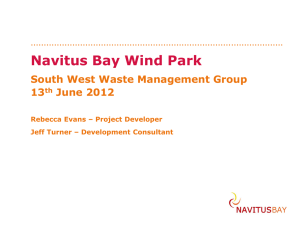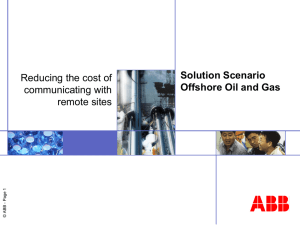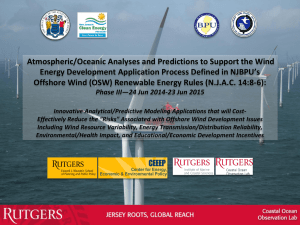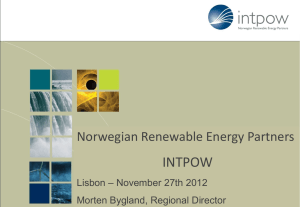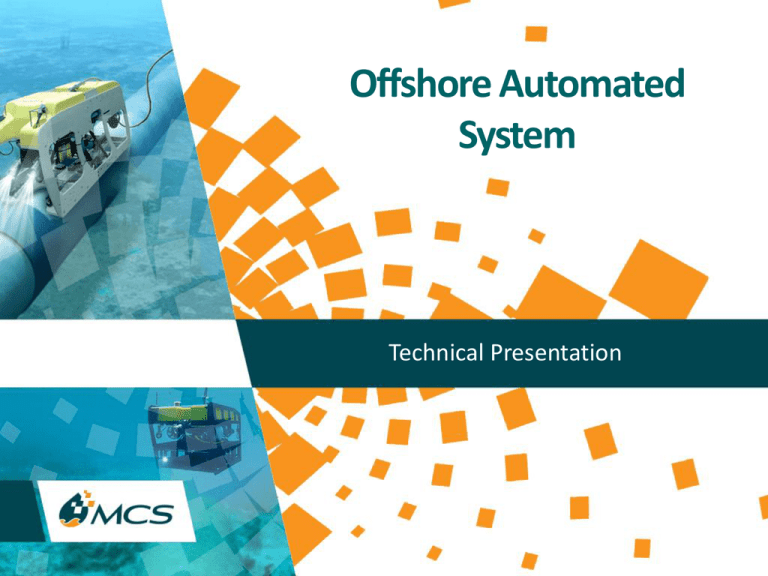
Offshore Automated
System
Technical Presentation
Offshore Automated System
Introduction
OAS is a server application that enables the data processor to be virtually on the vessel
logging, processing and QC data, however physically onshore. All logged sensors data
including multiple video streams are recorded, compressed and transferred online during
inspection projects utilizing the limited internet bandwidth available offshore.
Copyright (C) MCS 2013, All rights reserved.
www.mcsoil.com
2
Offshore Automated
System
Application Modules
Offshore Automated System
Consists of Three Modules:
• OAS Service
• Vessel Admin
• Office Admin
Copyright (C) MCS 2013, All rights reserved.
www.mcsoil.com
4
Offshore Automated System
1. OAS Service
This is the main service for the system to communicate and integrate, it is
responsible for data transfer, and handshaking between vessels and office
base onshore, and it doesn’t need any special setup or installation.
Copyright (C) MCS 2013, All rights reserved.
www.mcsoil.com
5
Offshore Automated System
2. Vessel Admin
• Application used to administrate OAS system on the Vessel.
• Defining Vessel.
• Defining Offices.
• Define data Packs preparation settings.
• Setting the sensors to be available.
• Responsible for data Packs preparation.
Every Time Interval:
• This sets the OAS to prepare a data Pack every defined time
Interval by the user (minimum 15 minutes)
• Video File End:
• This sets the OAS to prepare a Data Pack for every Video File
Recording End.
• Responsible for Sending Notifications to the Offices.
• Sends a notification to the office for every data Pack prepared to
be uploaded to offices.
Copyright (C) MCS 2013, All rights reserved.
www.mcsoil.com
6
Offshore Automated System
3. Office Admin
•
Application used to administrate OAS system in the Office.
• Defining Office.
• Defining Vessels.
• Set Publisher, and Initializes it.
• Responsible for data Packs Downloading and transfer.
• Downloads data packs from different vessels simultaneously.
• Adding completed data pack into its Mapped Pipe database.
• Receives notifications from vessels for the ready data packs to
be downloaded.
• Responsible of mapping vessels Projects and Pipes in the
office.
Copyright (C) MCS 2013, All rights reserved.
www.mcsoil.com
7
Offshore Automated System
Connections Capacity and Bandwidth
Dedicated Band width to MCS
Upload Speed Data Can be transferred /
Day
128 Kbps
16 KB/s
1.31 GB/Day
256 Kbps
32 KB/s
2.62 GB/Day
512 Kbps
64 KB/s
5.24 GB/Day
1 Mbps
128 KB/s
10.48 GB/Day
From the above table we can see that it is now applicable to transfer
the day data to the office for processing
Copyright (C) MCS 2013, All rights reserved.
www.mcsoil.com
8
Offshore Automated System
Data Flow: Between Vessels & Onshore Data Center
Resizing Video to
acceptable quality
for offline eventing
(11% original size).
Applying
Variable Frame
Rate (VFR)
reduction to 4%
of original video
data size
Combining 3
cameras video
to ensure time
synchronization
of videos
In case of data link
(128-256 kbps
dedicated),
the transmission
capacity shall be:54 -108 MB/hour
Or 1.3 -2.6 GB/ Day
Recording Data with high
compression routines
without affecting quality VBR
2-3 person
3+ person
Data Acquisition and QC Team
Synchronize Back
Processed Database only
(0.5% of bandwidth)
Copyright (C) MCS 2013, All rights reserved.
(Data Processing
Team)
Client
Access
Online
from
several
locations
www.mcsoil.com
9
Offshore Automated
System
Case Study
Offshore Automated System
Case Study:
•Offshore team reduced by 50 - 66% (4 -6 persons reduced to 2 persons)
•Assumptions
•Mob and Demob Cost = $3,000 per man / rotation
•$75 per man per day Accommodation onboard vessel
•Pipeline Inspection job Scenario
Savings:
$12,000
Mob and demob
$72,000
Daily rates offshore
$ 9,000
Accommodation offshore
$93,000
monthly cost saving
•Cost
Daily rates onshore at around 60% of offshore price would cost = $43,200 monthly
Productivity offshore is 70% of onshore = 43,200 * 0.7 = $30,200
•Direct Saving
Around $62,800 monthly / vessel by reduction of offshore personnel
Copyright (C) MCS 2013, All rights reserved.
www.mcsoil.com
11
Offshore Automated
System
Benefits
Offshore Automated System
Achieved Benefits
•
•
Ensure timely production of deliverables (charts and reports) in few days from demob.
Increase overall productivity by relying on permanent team working onshore through
the lifetime of the project.
• Increase Quality Control on deliverables by using dedicated QC team.
• Allow online detailed monitoring of the project progress internally by onshore project
manager and externally by the client representative onshore.
• Client access to raw data online from their offices overcoming the barrier of being on
the vessel.
• Ensure continuity of personnel along the life time of the project.
• Less Personnel offshore means smaller vessels, less risk and less cost.
• Ability to receive reports during the inspection to ensure client satisfaction and
completion of scope of work before vessel demobilization.
• Ability to utilize the Data Center Model:
• -Permanent staff during the lifetime of the project.
- Flexibility of resizing office team based on variation of workload.
-Ability to use dedicated team for dedicated tasks to improve quality of deliverables (QC
team, offline video review team, reporting, charting…etc.)
Copyright (C) MCS 2013, All rights reserved.
www.mcsoil.com
13
Copyright (C) MCS 2013, All rights
reserved.
www.mcsoil.com
14

